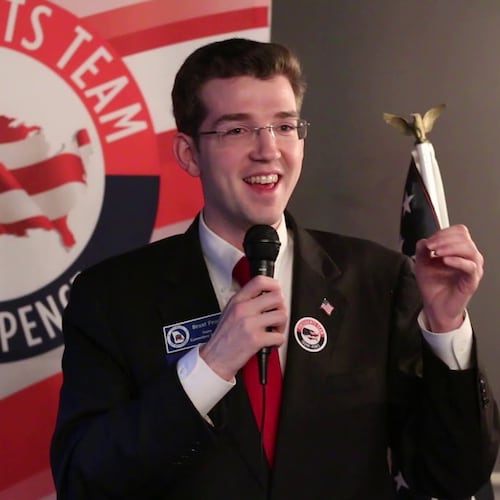What to know about the Iowa caucuses:
How do the Iowa caucuses work?
Voting in a caucus isn’t as simple as showing up to a polling precinct on your lunch break and casting a ballot. A caucus typically requires at least an hourlong commitment on a frigid winter night full of speeches and maneuvering. Both parties allow only registered Republicans and Democrats to caucus, but they both offer same-day registration.
The rules differ sharply depending on the party.
On the Republican side, caucus goers listen to surrogates for each candidate - and sometimes the candidate themselves - deliver speeches before they submit their votes on a slip of paper. The results are reported to the state party and then the media.
Democrats have an added wrinkle in their process. Voters are asked to indicate their choice for the nominee by standing in certain parts of the room designated for each candidate. If one candidate fails to get at least 15 percent of the room’s support, they are free to support a different candidate. It often sets up a scramble for support, as surrogates for the remaining candidates are allowed to make personal appeals.
What time does it start?
Voting at the roughly 2,000 caucus sites begins at 7 p.m. Central.
Why Iowa?
Critics say Iowa gets far too much attention and note that its largely white and rural electorate isn’t reflective of the more diverse nation. And the state is sometimes a poor barometer for who the nominee will be, particularly on the Republican side. But Iowans are proud of their first-in-the-nation status, and demand a retail-level politics that supporters believe can help winnow the field.
What’s at stake?
Plenty. If Donald Trump pulls out a victory, he could set the stage for a sweep of New Hampshire and South Carolina - and make it even more difficult for any other rival to stop his path to the nomination. His main rival in Iowa, Texas Sen. Ted Cruz, hopes that a victory here could give him a springboard to the conservative states in the south. And Florida Sen. Marco Rubio could emerge as the establishment favorite with a strong showing in Iowa.
For Democrats, a victory for Vermont Sen. Bernie Sanders would damage Hillary Clinton’s aura of inevitability - and set up a showdown in South Carolina, Georgia and the other mostly Southern states that vote over the next few weeks.
About 2,000 people live in this speck of a town in rural southeast Iowa. And roughly one-quarter of them showed up to a plastics warehouse on a frigid weekend night to hear Texas Sen. Ted Cruz make his best pitch for the White House.
Presidential candidates have crisscrossed the state for months to woo voters willing to spend hours on Monday caucusing for them. But even in Iowa, this riverside hamlet is off the beaten trail. And the voters who gathered here showed their appreciation by pledging their loyalty to Cruz and his take-no-prisoners style.
“He’s got a backbone, and that’s what I love about him,” said Tammy Payne, who signed up to be a first-time caucus captain for Cruz. “The country is going down the wrong track. We’re in debt. We’re in trouble. And he can fix it.”
The battle for Iowa voters has been a race to the flanks of both parties. And the decisions that Payne and her neighbors make on Monday could hold clues to how Georgians might cast their ballots when they head to the polls March 1.
Only twice since 1984 have the two states deviated on the GOP side of the ballot: Georgians sided with George H.W. Bush in 1988 while Iowa Republicans backed Bob Dole. And in 2012, a conservative wave helped then-U.S. Sen. Rick Santorum win Iowa while Peach State Republicans backed native son Newt Gingrich.
The two states' GOP electorates are largely similar. They are overwhelmingly white, conservative and religious. Roughly 60 percent of Iowa Republican caucus voters the past two cycles considered themselves to be evangelical or born-again Christians. A January poll commissioned by The Atlanta Journal-Constitution showed a similar proportion of Georgia Republicans considered themselves to be in the same category.
“The Iowa caucus Republican voters are the most conservative group of any Republican voters that you can find,” said Alan Abramowitz, an Emory University political scientist who has studied the early-voting state. “You have a lot of evangelicals, conservatives — voters who want someone who is an ideological purist.”
Democrats in Iowa and Georgia have backed the same candidate even more frequently, diverging only once in the past quarter-century. That was in 1992 when Georgia Democrats endorsed Bill Clinton while Iowa voters went with local politician, U.S. Sen. Tom Harkin.
There are key differences, however. Iowa’s Democratic base is far whiter and more liberal than Georgia’s Democratic electorate. It’s one reason why Clinton’s campaign sees Southern states such as Georgia — where she hopes to leverage her support with black voters — as a firewall in case she loses in Iowa.
Meeting the undecideds
With two days left before the caucus, most of the candidates used the weekend to stage events in all corners of the state to make their final argument.
Cruz is locked in a fight with billionaire Donald Trump for the evangelical conservatives who dominate the GOP base. And Vermont U.S. Sen. Bernie Sanders, with his searing indictment of capitalism and calls for more economic equality, has gained traction with many of the state’s liberal voters in a race against Hillary Clinton. As of late Saturday, however, both races remained tight. The last Des Moines Register/Bloomberg Politics poll to be released before the caucuses, showed Trump still on top and Clinton with a slight edge over Sanders.
Sanders’ campaign believes it has momentum on its side and the candidate showed no sign of slowing down. In the nearby town of Washington, dozens of people squeezed into Cafe Dodici, cheering “Bernie” as he arrived for a stop there.
Lorraine Williams, the 59-year-old owner of the restaurant, is also the chair of the Washington County Democrats.
“He has the moral authority to bring back the middle class,” she said. “I agree with him on every single issue. So we need to get out there.”
Republican establishment figures have struggled to consolidate support, but they also kept pushing throughout the weekend. Ohio Gov. John Kasich got a surprise lift Saturday when the New York Times endorsed him, along with Clinton on the Democratic side. Kasich, former Florida Gov. Jeb Bush, New Jersey Gov. Chris Christie, Florida U.S. Sen. Marco Rubio and their super PACs have pumped tens of millions of dollars into attacks against each other, and against Cruz and Trump.
They’re fighting for the likes of Jill Holmes, that most valuable of Iowa voters. She’s an undecided Republican who will most definitely caucus for someone on Monday. As the clock ticks down, she’s leaning toward retired neurosurgeon Ben Carson - but she’s open to a last-minute change.
“I thought I was going to support Kasich until I heard Carson. And then I decided that I have an opportunity to hear five out of the seven top contenders without having to go far,” she said. “So I’m going to seize the opportunity. I think we don’t realize the opportunity we have.”
She was among about 200 Iowans who packed the University Club in Iowa City to hear Christie on Saturday morning. The same venue hosted Carson and businesswoman Carly Fiorina in the last five days, and Holmes said many of the voters who crowded into Christie’s town hall meeting were also at the earlier events.
“Many of us still haven’t made up our minds,” she said.
And, after hearing Christie’s roughly hourlong town hall meeting, neither had she.
“He’s pretty convincing, isn’t he? I guess I got to throw him in the mix. I have a pretty strong hunch that Monday night I’ll cast a vote for a governor,” said with an exasperated look. “Jeez, does that make me sound wishy washy?”
A fight for the fervent
That’s why Cruz’s campaign operatives are so confident, even after an uneven performance in last week’s debate in Des Moines.
The retail politics of Iowa usually rewards the campaigns with disciplined get-out-the-vote efforts and fervent volunteers. And Cruz’s most determined loyalists - he calls them his “grassroots army” - were hard to miss at his Wapello event.
Parents brought their children, who were promptly supplied with Cruz coloring books. Babies cooed in strollers as Cruz supporters traded their fears over the nation’s future. And none of the dozen or so caucusgoers interviewed betrayed any sense of doubt about Cruz.
“I’ve got to be honest with you: I’m scared. I’m scared about what we are leaving for our grandchildren,” said Matt Schultz, Iowa’s former secretary of state. “I’m not sure that we are leaving that dream I grew up with - the American dream - for our children or grandchildren. We need someone who can fight to reclaim that dream.”
As he prepares for a showdown with Trump, who has dominated news cycles in Iowa just as he has in Georgia, even Cruz’s most hardened supporters are wary. Melinda Wadsley, a Cruz supporter handing out packs of blue stickers at his rally, sees a silver lining.
“You know what’s funny? It seems weird to say this, but thank goodness for Trump,” said Wadsley. “Ted Cruz was known as the abrasive loudmouth before this campaign. But now he’s nothing compared to Trump.”
About the Author
Keep Reading
The Latest
Featured



